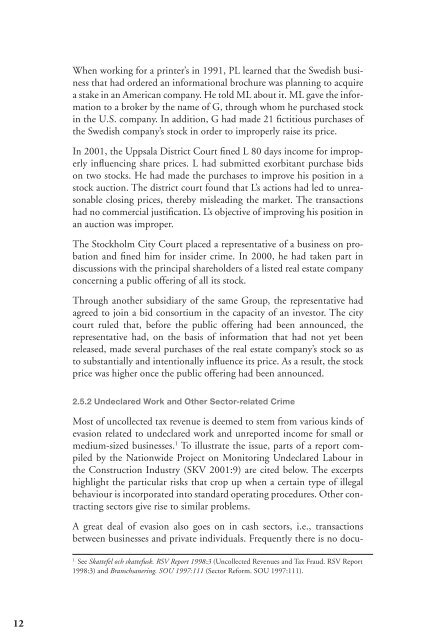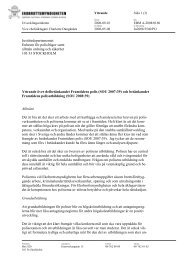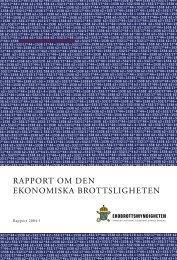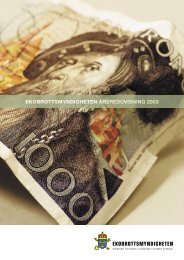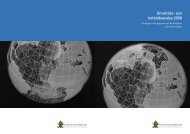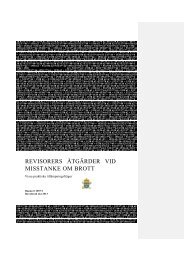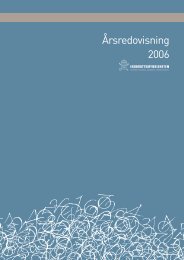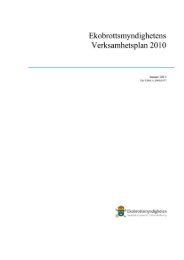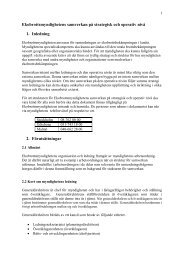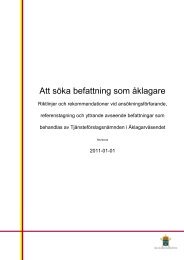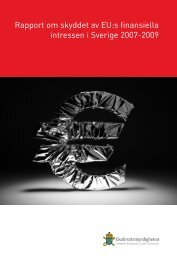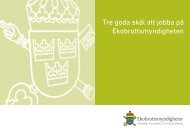Economic crime report 2004 - Ekobrottsmyndigheten
Economic crime report 2004 - Ekobrottsmyndigheten
Economic crime report 2004 - Ekobrottsmyndigheten
You also want an ePaper? Increase the reach of your titles
YUMPU automatically turns print PDFs into web optimized ePapers that Google loves.
When working for a printer’s in 1991, PL learned that the Swedish business<br />
that had ordered an informational brochure was planning to acquire<br />
a stake in an American company. He told ML about it. ML gave the information<br />
to a broker by the name of G, through whom he purchased stock<br />
in the U.S. company. In addition, G had made 21 fictitious purchases of<br />
the Swedish company’s stock in order to improperly raise its price.<br />
In 2001, the Uppsala District Court fined L 80 days income for improperly<br />
influencing share prices. L had submitted exorbitant purchase bids<br />
on two stocks. He had made the purchases to improve his position in a<br />
stock auction. The district court found that L’s actions had led to unreasonable<br />
closing prices, thereby misleading the market. The transactions<br />
had no commercial justification. L’s objective of improving his position in<br />
an auction was improper.<br />
The Stockholm City Court placed a representative of a business on probation<br />
and fined him for insider <strong>crime</strong>. In 2000, he had taken part in<br />
discussions with the principal shareholders of a listed real estate company<br />
concerning a public offering of all its stock.<br />
Through another subsidiary of the same Group, the representative had<br />
agreed to join a bid consortium in the capacity of an investor. The city<br />
court ruled that, before the public offering had been announced, the<br />
representative had, on the basis of information that had not yet been<br />
released, made several purchases of the real estate company’s stock so as<br />
to substantially and intentionally influence its price. As a result, the stock<br />
price was higher once the public offering had been announced.<br />
2.5.2 Undeclared Work and Other Sector-related Crime<br />
Most of uncollected tax revenue is deemed to stem from various kinds of<br />
evasion related to undeclared work and un<strong>report</strong>ed income for small or<br />
medium-sized businesses. 1 To illustrate the issue, parts of a <strong>report</strong> compiled<br />
by the Nationwide Project on Monitoring Undeclared Labour in<br />
the Construction Industry (SKV 2001:9) are cited below. The excerpts<br />
highlight the particular risks that crop up when a certain type of illegal<br />
behaviour is incorporated into standard operating procedures. Other contracting<br />
sectors give rise to similar problems.<br />
A great deal of evasion also goes on in cash sectors, i.e., transactions<br />
between businesses and private individuals. Frequently there is no docu-<br />
1.<br />
See Skattefel och skattefusk. RSV Report 1998:3 (Uncollected Revenues and Tax Fraud. RSV Report<br />
1998:3) and Branschsanering. SOU 1997:111 (Sector Reform. SOU 1997:111).<br />
12


